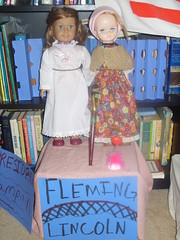
Yes, Vice-Presidential Candidate Potter is indeed My Friend Mandy. She was my doll when I was a kid and now the girls get to play with her.






Mod: Miss Fleming, you have stated that you want to abolish the words, "dumb,' "nuts", "crazy", "mean", "little one", and "s-word". Will you please explain why you think it is right to forbid people to say these words?
Miss Fleming: The reason I want to abolish those words is because they are mean. Out of all the words in the english language-- there are millions-- why use the ones that offend people? the words we have already abolished in the house are good to be abolished, but I believe the citizens have been given a little too much freedom of speech. Including myself.
Mod: Okay. Let me give you a hypothetical situation. Hypothetical means something that might happen but hasn't happened yet. Let's say these words were abolished and one day someone in the house was grumpy and another person said something that upset that first person. Before the aforementioned were abolished, the offended person might have called that other person 'dumb' or one of the other words. Now this person knows she will have a punishment for saying that word, so what do you think she will do?
Miss Fleming: We would have to know what the second person said. Suppose the person said, "Hey you mr. grumpy gills!" and the person really fried up about that. If I were in that position I would say, "Oh, just go away! I don't want to blow up at you!"
Mod: Miss Green, same question. Why do you think it is right to abolish those words?
Miss Green: After thought I have realized, we don't even need to abolish these words. After all, the words themselves are not what is messing up the situation. It's the way the other person received those words.
Mod: Okay. So you are saying that if the person being called a name would just not be so sensitive, there wouldn't be an issue?
Miss Green: I'm saying that instead of abolishing these words-- after all, we are going to be bumping up against them in regular life anyway-- we ought to teach citizens how to respond to these sort of words without blowing up, saying something rude back, or even having to leave the room. We ought to teach them the proper response to these words so any time these words come up, they can avoid losing their temper. I'm still saying I think you shouldn't say them, but I don't want to go so far as abolishing them.
Mod: Mr. Kermit, do you think it is right to abolish these words?
Mr. Kermit: Well, I agree with Miss Green. She is right by saying that we shouldn't abolish so many words. But I still think that we should abolish 's-word'.
Miss Green: I agree.
Mod: Miss Fleming, do you think 's-word' ought to be abolished.
Miss Fleming: Yes. And I want to say that not all of us can take it like water off a duck's back. We need to do what's best for everyone and not just for a few people.
Mod: Okay. I have another question. Miss Fleming, it seems to me that the more words we abolish, the more creative people will get when they feel the urge to call someone a name. How do you propose to get around this?
Miss Fleming: What do you mean?
Mod: Well, right now there are a very few words in this household nation that are forbidden to say. The people of this nation are very good to stay away from those words. One such word is 'stupid'. Now, citizens never say this word. However, they think it is okay to say 's-word'. That means the same thing as 'stupid'. So if we abolish this new list of words, what is to stop citizens from coming up with other codes to get their name-calling points across?
Miss Fleming: Not all of us say 's-word.' I have nothing else to say.
Miss Green: I agree with what she said about how some citizens can't take it like water off a duck's back. That is why we need to teach them to do so. After all, they can't blow up at people of other nations.
Mod: That's a good point. I think teaching restraint is wise. But what about the name-caller?
Miss Green: I've read of a family who had a jar, and every time someone did something-- in our nation it would be whenever someone said a restricted words-- they had to drop in a dime. Whenever the jar was filled up, they would take all the money out, explain why you don't call names, and then use the money to go out for a treat.
Miss Fleming: Anyone in the family? Including the government?
Miss Green: Yes.
Mod: As the chief bureaucrat of this government, I see some problems with the administration of this plan. Please tell me how you propose to implement the consequence if the government is not in the room when the word is said. For instance, if it is one person's word against another's.
Miss Green: Nobody ever says a bad word to themselves. I would bring a witness along, but also, if all the citizens are trustworthy, then when the word is said, the other person will remind the first person that she said a word, and the person will go put a dime in the jar.
Miss Fleming: I saw a flaw in your plan. It'll make the people want to say bad words because they'll know there will be a reward at the end.
Miss Green: If they want to put dimes in the jar, they can do it any time.
Mod: Miss Green, you said 'if all the citizens are trustworthy.' I beg leave to point out that if all the citizens were trustworthy, and this was just bad habit, we wouldn't need this law.
Miss Green: Well, I know that for some of us, it's a bad habit, and this would be a way to break the bad habit.
Mod: Okay. I have to say, as a member of the government, that I really see this as a heart issue as well as a bad habit. I think a jar with dimes is a little premature and we have some heart work to do first. How would you combat the heart issue behind the bad habit?
Miss Green: I would have, in addition to the 10-cent fee, you have to do a heart journal.
Miss Fleming: Ooh, I like that idea.
Mod: Okay, I have another question. What if, instead of saying one of the verboten (that's 'forbidden' in German) words, the person who is upset says, "Aw, you're just an old peanut-butter sandwich." But she means it in a really hurtful way.
Miss Green: It doesn't matter. It's the thought that counts, the intent!
Miss Fleming: But the words still need to be forbidden because they are awful!
Miss Green: But so is 'peanut-butter sandwich' if it is said the same way!
Mod: Well, how do we teach people to be loving even when they don't feel like it? Isn't that the root of the issue?
Miss Green: Why not charts?
Mod: As the government, I am a little resistant to charts. I have charts for school schedule, for Girl Scouts, for chores, for school assignments, for science fair, etc., etc. I do not need another chart to look after.
Miss Green: The citizens could do it.
Mod: Are you saying that every citizen would have to submit to keeping a chart?
Miss Green: I'm saying that every citizen should find something like this that will work best for them, and keep track of how many times we say words like this. I'm sure there are other ways besides charts.
Mod: My question is, would each citizen be required to do this?
Miss Green: Yes.
Miss Fleming: I don't like charts. Charts are awful.
Mr. Kermit: I agree with Miss Green.
Mod: Miss Fleming, do you have any other ideas, or any other thoughts to share with us?
Miss Fleming: I don't think there should be any charts. I like the jar suggestion, except I think that whenever we *stop* ourselves from saying a bad word, we should put a coin in the jar. Bigger than a dime.
Mod: So you are saying that you think putting money in when you say a bad word is a form of reward and not punishment.
Miss Fleming: Yes. And then when we fill up the jar, we get to take it and do something fun.
Mod: Okay, we didn't reach consensus on this one. 'Consensus' is when a group as a whole comes to a position about something. Our time is up, so let's continue discussing this later.
Moderator: Miss Fleming, in your position statement on this issue, you stated that "when we are saving for things we want, the item itself is the reward." Would you elaborate on that?
Miss Fleming: I think that the item itself is the reward because the citizen has had the long and hard time saving up the money, penny by penny, dollar by dollar, to get the item. If it is an item like a doll that is ten bucks, the government should not lend it money and the person say that they will lend it later. And the person should not seek help from the other citizens. One citizen went to another citizen and asked for $4 to complete the saving of the money for a doll. She consented and she thought that the $4 was never paid back, but she found out in the last several weeks that it was, and her head is greatly relieved from that. If you borrow money, you have to pay it back, and the government has gotten into a big mess concerning that, and it's awful. As Dave Ramsey says, we'll be eating beans and rice, rice and beans, though occasionally there is a steak dinner. So that is why I believe that we should not borrow money, but if we do borrow money-- if it's offered to us and we accept, as soon as we buy the object of our desire, we must work to pay it back. If we cannot pay it back, we must tell the citizen that lent us money that we cannot pay it back and they may have something that belongs to you that is worth the amount of money."
Mod: Miss Green, you expressed a similar viewpoint when you said, "Saving for an item provides a sense of accomplishment in itself." Will you please elaborate on your statement?
Miss Green: Well, as Miss Fleming has said, saving for an item is a reward in itself, and the value of the reward depends on the value of the item. For example, saving up for a doll that costs ten dollars is not at all like saving for a package of gum that costs a dollar. The reward is perhaps ten times larger, and probably, the item is worth at least ten times as much. Of course, this doesn't excuse us from making sure we get the best deals possible. Another reason I said that is because I think that when a person has a reward for something good they've done, they think, Wow, that kind of works! I think I'll try that again." This is a good way for them to realize that immediate gratification is not such a good thing, because, after all, if they spend their money on the aforementioned pack of gum. they are that much farther away from getting their real goal. I don't believe I disagree with Miss Fleming.
Mod: Mr. Kermit, you have heard your two opponents' views concerning citizens saving for things they want. What do you think about it?
Mr. Kermit: I agree with everything.
Mod: Since everybody seems to agree, I'll go to the next question without having any discussion.
Miss Green, in your position statement, you mentioned a campaign to encourage saving. Will you tell us about your plan for that?
Miss Green: Every citizen likes to spend time with the leaders of our government, and so not only would this be a good citizen/government relationship time, it would also encourage short-term savings. I suggest that the government should sit down with each citizen and discuss why it is good to save for something. They might go online together to find good things to save for. Then, whenever temptation comes in view, the government can quietly remind the person, "Remember, you're saving for this!" Although this may not be enough to deter the citizen, it will serve as a warning so they will stop and think before continuing their actions.
Mod: Miss Fleming, what do you think of Miss Green's plan? Do you have your own plan? If so, what is it?
Miss Fleming: I approve of Miss Green's plan because it is a perfect idea. A good example is a citzen had enough money for something and they are going to the store, but then they see something else they would like to buy before they go to the store where their desired object is. They would like to buy the other item, but the government should say, "I thought you were going to get this instead of that," and if the citizen does not pay attention to the government, the citizen will have to suffer by having to save up again.
Mod: Mr. Kermit, same questions.
Mr. Kermit: Yes, I approve it. No, I don't have a plan.
Mod: It sounds to me like you all would like the moral support of the government, without actually having laws and consequences in place. Is this right?
All: Yes.
Miss Fleming: It's their own fault if they don't get their desired object, and the government should not inflict other consequences. We're overloading Mommy. Poor government.
Miss Green: And after all, it is the citizen's own money. They are the ones who saved up and they shouldn't be dictated to about it.
Mod: Miss Green, that brings up another question-- a bit off-topic, but I'm going to ask it anyway since all of you seem to agree on the other issue. What do you think about the government prohibiting the purchase of certain items?
Miss Green: I'd like the moderator to define 'certain items'.
Mod: Okay. Items the government deems not in the best interest of the citizen.
Miss Green: I think that this really would not be an issue, since the government has pretty much instilled some common sense into the citizens' heads. The citizens already know enough not to purchase items detrimental to their health, mental or physical.
Mod: Miss Fleming, what is your position on that question?
Miss Fleming: Same as Miss Green. You know, if we keep going on like this, we will end up not having any debates!
Mod: Mr. Kermit, what do you think about the government prohibiting the purchase of certain items?
Mr. Kermit: We all agree.
Mod: Okay. Well, I think we can pretty much put this one to bed. Everyone already agrees. No need to vote on this issue. That makes it a non-issue.
Miss Fleming: Let's vote on Triss' cell phone!
Mod: We'll leave that for another day.
Mr. Kermit: I think we should scare it off with a broom whenever it comes.
Miss Fleming: We must remember the people living around us, so we shouldn't spray the cat with a hose. We should thrash our arms around wildly to scare it away.
Miss Green: Sometimes the cat needs to cross our fence to get back to her property, so even though she must be driven away, we mustn't hurt her. I propose that we wave our arms or make frightening gestures.
Mr. Kermit: Yes, the reward should be a dollar from the government. It should be given when the person is finished saving, before she spends the money on the special item she has been saving up for.
Miss Fleming: Everyone should save money in three categories-- church money, saving money and spending money. Incentives are a good idea. But when we are saving for things we want, the item itself is the reward. I am against other incentives.
Miss Green: Saving for the item provides a sense of accomplishment in itself. We need to encourage everyone to save toward a goal, like the purchase of something they want. I think the government should help citizens find something to save for and help them stick to that goal. The government should sit down with each citizen and help them decide on something to save for, and later when the citizen wants to spend money on something else, the government should remind them that they are saving for something else. I don't think there should be a consequence for not saving because it is the person's own money. I think the government ought to make the citizens aware of the benefits of saving. I want to educate the citizens so they can make wise decisions for themselves.
Mr. Kermit: I want to paint everything. I don't know what color. Some citizens have very bad allergies, and I want them to feel better so we should have wood flooring. Plus, shoes make a nice tapping sound on a floor when it is wood.
Miss Fleming: We should paint because it will be a job for everyone and it's fun and I've never gotten to paint before. We shouldn't use wallpaper because people might have two kinds of wallpaper they want and we can't have both, but we can have more than one color paint. Chores: We like variety. We should switch every month-- living room to kitchen to laundry room.
Miss Green: We should put up new wallpaper over the old scraps in the bathroom. I prefer paint, but it is difficult to remove the old wallpaper and if we use wallpaper, we won't have to remove the old. As for chore assignments, having the same chore for a long period of time helps a person learn to do the job quickly and efficiently. But some people are not satisfied with their jobs. If someone wants to trade, and finds another person who is willing to trade with them, they should be allowed to trade. But no one should be forced to give up a job if they don't want to trade.
Mr. Kermit: Sometimes I do. Citizens shouldn't say bad words and mainly if they say 's-word' to someone they should get hot sauce or soap. Or if they say it they should have to write down how the other person might have felt when they said that to them, and also write down all the nice things about that person.
Miss Fleming: I believe there should be a few limits on free speech. The government has put limits on cursing, swearing and other strong language that is in the world. The words I would like to abolish are "dumb", "nuts", "crazy", "mean", "little one", and "s-word". If I am elected, the first month I will put up a sign that says, "Put a watch over your mouth. Do not say dumb, nuts, etc." If a person says one of the words, he or she will lose a point or two. The words will no long be regarded as 'minor' bad words, but as regular bad words.
Miss Green: I agree that there are several words that should be abolished and should no longer be regarded as minor bad words. After all, if the thought is what counts, they are no better than horrible words when applied to a person in a derogatory manner. The point system works very well and ought to be continued.
Mr. Kermit: Yes. And it should be respected and not thrown around. Then citizens wouldn't have to use the government's phone if they go on bike rides. Triss could use her own phone. And she could call her friends. Everyone could chip in to pay for the minutes.
Miss Fleming: If I am elected, Triss will get a phone. Citizens in other countries have cell phones and the other citizens of our country will benefit from Triss having it. The other citizens ought to help pay for it because they will benefit.
Miss Green: If Triss had a cell phone, she would need to buy minutes. Getting a cell phone for Triss is not a good idea unless she has help paying for it. It would be useful when the nation needs to do two errands at the same time. The Queen Mother and Triss could communicate via cell phone while both are out at different places. If the other citizens did not mind helping to pay for an item they cannot use but would benefit from, it is a good idea. We need a special referendum on the ballot to decide whether the citizens of our nation ought to be taxed to pay for a cell phone for Triss. They would benefit from it even though they couldn't use it.
Mr. Kermit: Yes, because citizens need to not get their brains all rattied up and have big, bad headaches. I think it should be an hour per day, including schoolwork. The punishment should be not having the computer the next day. The government could use a chart to keep track of it.
Miss Fleming: I believe that citizens should have seven hours per week, not including schoolwork, and use them in any amount. But citizens should not be able to store up hours for use he next week. The consequence should be only four hours the next week. A chart is a very good idea. My idea is to make a chart for the week and have seven slots and when you use an hour, you put an x in one of the slots. If I become President, it will be my duty to design the chart myself.
Miss Green: My idea is that citizens should have a certain amount of hours per day and if they go over the hours one day, then however many hours they went over will be taken off the next day. Miss Fleming suggests that if hours are not used, they should not be carried over to the next week. I disagree. If citizens happen to be doing different things, then all their time for the week is completely lost. With my system, even if they happen to not use all the hours, they will still have rollover hours or minutes. The consequence for going over should be losing the same amount of minutes the next day. I agree with the idea of a chart, but since everybody's is going to be a little different, timers should be kept by the computers and also a piece of paper on which is written the total number of hours, and citizens should add and subtract minutes as needed, with the government's assistance as necessary.
Mr. Kermit: Some citizens do not need as much time because they are younger and do not have as much schoolwork. Some kids might need it and some kids might not. I haven't decided on this issue.
Miss Fleming: The reason I believe citizens should have more school time with the Queen Mother is because many times they have come out feeling that they needed more time with her, that their time was collapsed and taken away. If I am elected, I shall make sure the one hour time span is increased to two hours, or at least an hour and thirty minutes, because I feel that children need more time with their mothers. If I am elected President, I believe we should have more time so we can learn more things that we need to learn. In doing this, we can create a relationship, and relationships are important-- as important as education.
Miss Green: I have seen the Queen Mother's schedule and these times bump right against each other. Lengthening the segments would create an even longer school day and would cause the Queen Mother to have less time to do other things she needs to do. All the citizens that I have seen do their work with the Queen Mother seem to come out right on time. I don't think more time is needed. If there are special needs-- if there isn't enough time for reading and discussion or someone needs help on math-- the Queen Mother should have a separate time block at the end of the school day to help any child who needs extra time. This would prevent another citizen from having to wait even longer for her first turn.
1. This election is theoretical only. Any Presidential position an inanimate object has in this house is purely ceremonial and imaginary.
2. Positions are limited by the Constitution of the United States (but our household 'nation' will be thought of as nation, state and city, all three). As in real life, the Constitution is open to interpretation.
3. The election will take place by secret ballot on November 4th. Each real person living in our house will have one vote. In the event of a tie, there will be a run-off election one day later.
4. There will be a time for speeches, debates and question-and-answer sessions prior to the election (date and time TBA). Each candidate will also be given equal cyber-time on Mom's blog.
5. The winning candidates will be given the title of Mr./Miss/Mrs. President and Mr./Miss/Mrs. Vice-President and will have a ceremonial (non-voting) seat at family councils. (We hold family councils very infrequently, so I don't know how much of an honor this will be. Still.)
6. Mom's help will be freely given to each candidate who asks.
1. How to deal with the black cat (he comes into our yard and scares Thumper), snakes, mice, and other critters in the neighborhood (foreign relations)
2. Incentives for having short-term saving (the economy)
3. Keeping the house clean, chore assignments, gardening and landscaping, redoing the walls in the girl's bathroom (infrastructure)
4. Name-calling, put downs, personal remarks (hate speechlimits on free speech).
5. Telecommunication-- should Triss have her own cell phone? (infrastructure)
6. Regulating time per day on computer (health)
7. Individual school time with mom-- should it be increased? (education)